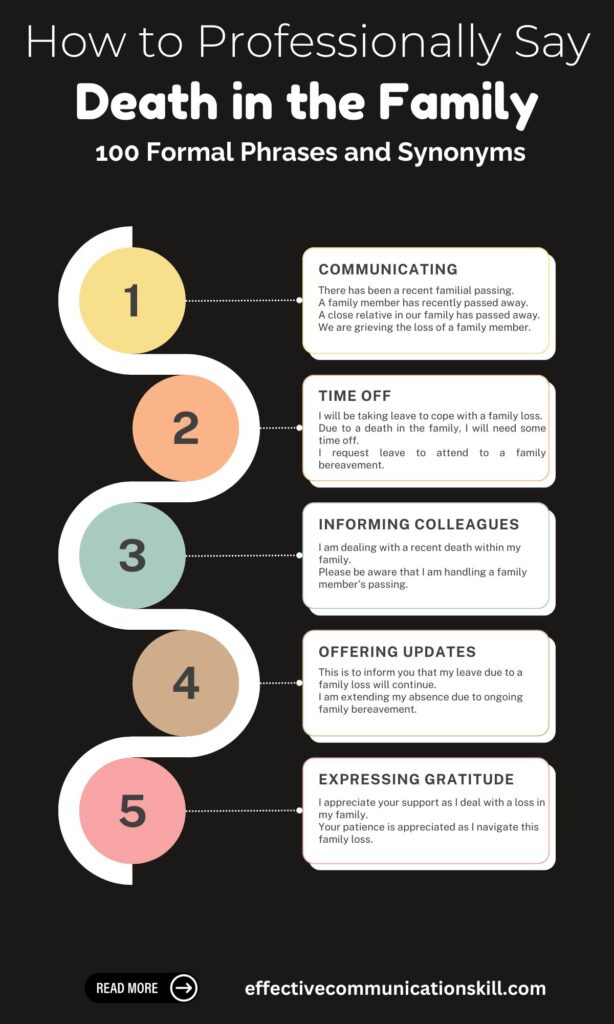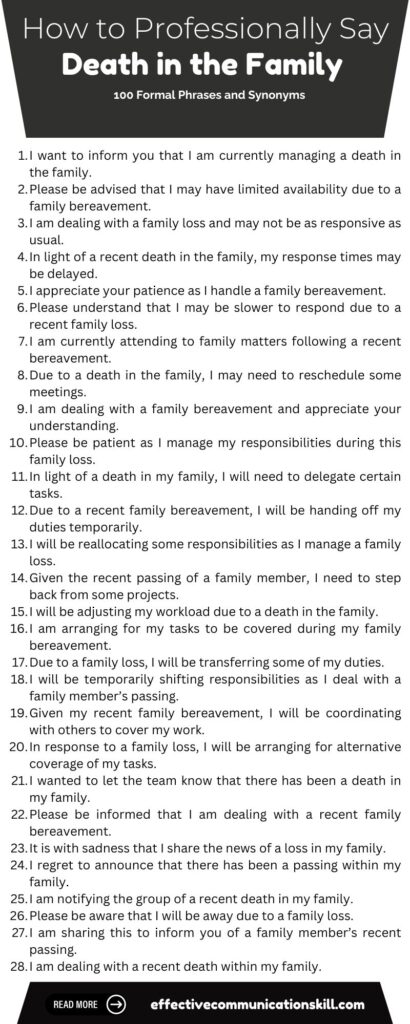How to Say Death in the Family Professionally
Facing the reality of a death in the family is never easy, and communicating this sensitive news professionally requires a delicate balance of empathy and discretion.
Whether you’re informing colleagues, clients, or your employer, knowing how to say death in the family professionally can help maintain respect while conveying the necessary information. This approach not only ensures that you manage the situation with grace but also helps in preserving your professional relationships during a challenging time.
How to Professionally Say That Sounds Like a Problem – By using tactful language and clear communication, you can navigate these conversations with sensitivity and respect, ensuring that your message is received with understanding and compassion.
In this blog post, we’ll explore the best practices for handling such personal news in a professional setting, offering practical tips and examples to guide you through these difficult conversations.

How to Say Death in the Family Professionally
Saying death in the family politely with professionalism requires sensitivity and clarity. These tips will guide you in delivering such messages respectfully and appropriately in various contexts.
Use Clear and Concise Language
When informing others about a death in the family, clarity is essential. Choose straightforward language to avoid confusion while still showing respect.
Example: “I wanted to let you know that I recently experienced a loss in my family. My [relation], [Name], has passed away. I will need some time off to attend the funeral and manage related responsibilities.”
Offer Brief and Relevant Details
Providing brief details helps others understand the context without overwhelming them with personal information. Focus on what is necessary for professional purposes.
Example: “Due to a recent death in my family, I will be taking leave from [dates]. This time will be used to handle family matters and make necessary arrangements.”
Express Gratitude for Understanding
Acknowledge the support and understanding of your colleagues or clients. This shows appreciation for their consideration during a challenging time.
Example: “Thank you for your understanding and support during this difficult period. I appreciate your patience as I take the time needed to manage my family responsibilities.”
Maintain Professional Boundaries
While it’s important to be honest, keep the focus on how the situation will impact your professional responsibilities rather than delving into personal details.
Example: “I am dealing with a personal loss and will be out of the office from [dates]. Please contact [alternative contact] for any urgent matters during my absence.”
Follow Up with Updates if Necessary
If your absence will be extended or if there are changes to your initial plan, keep relevant parties informed with updated information to ensure smooth transitions.
Example: “I wanted to provide an update regarding my leave. Due to ongoing family matters, I will need to extend my absence until [new end date]. I will keep you posted on any further changes.”
Formal Synonyms for Death in the Family
Here are 20 professional synonyms for death in the family:
- Loss of a loved one
- Bereavement in the family
- Shocking death in the family
- Death of a family member
- Grief within the family
- Loss within the family
- Passing of a family member
- Family loss
- Family’s recent bereavement
- Departure of a family member
- Family member’s passing away
- Family’s recent sorrow
- Loss of a relative
- Death of a family relative
- Recent death in the household
- Family mourning period
- Departure of a loved one
- Family member’s recent passing
- Loss experienced within the family
- Passing of a loved one in the family
80 Professional ways to Say Death in the Family
Explore a comprehensive list of over 140 formal phrases for politely saying death in the family. These phrases provide diverse options for conveying your message with the utmost respect and professionalism.
Communicating the Event
- I regret to inform you of a death in the family.
- We have recently experienced a loss in our family.
- Our family is mourning the passing of a loved one.
- Unfortunately, we have suffered a bereavement within the family.
- There has been a recent familial passing.
- A family member has recently passed away.
- Our family is currently dealing with the loss of a loved one.
- A close relative in our family has passed away.
- We are grieving the loss of a family member.
- I am saddened to share that we have had a death in the family.
Requesting Leave or Time Off
- Due to a death in the family, I will need some time off.
- I request leave to attend to a family bereavement.
- I need to take time off due to a recent loss within my family.
- Please allow me time away to manage a family member’s passing.
- I will be absent due to the passing of a loved one in my family.
- I am requesting time off to handle family bereavement matters.
- Time away is needed to address the death of a family member.
- I must take leave due to a recent bereavement in the family.
- Time off is required for me to manage a loss in my family.
- I will be taking leave to cope with a family loss.
Informing Colleagues or Clients
- I wanted to inform you that there has been a death in my family.
- Please be advised that I am dealing with a recent family loss.
- Kindly note that there has been a bereavement in my family.
- I regret to inform you that a family member has recently passed.
- I am writing to share that there has been a family bereavement.
- This is to notify you of a recent passing within my family.
- Please be aware that I am handling a family member’s passing.
- It is with sadness that I inform you of a loss in my family.
- I need to inform you that a loved one in my family has passed.
- I am dealing with a recent death within my family.

Offering Updates or Follow-ups
- I wanted to update you regarding my leave due to a family death.
- Please be advised of an extended absence due to a recent family loss.
- I am writing to provide an update on my family bereavement leave.
- This is to inform you that my leave due to a family loss will continue.
- I am extending my absence due to ongoing family bereavement.
- Please note that I will be away longer due to a recent family passing.
- I am following up to confirm my extended leave due to family loss.
- Please consider this a follow-up on my leave related to a family death.
- My leave has been extended as I continue to manage a family bereavement.
- I am updating you on my leave situation due to a death in the family.
Expressing Gratitude and Closing
- Thank you for your understanding during this family bereavement.
- I appreciate your support as I deal with a loss in my family.
- Your patience is appreciated as I navigate this family loss.
- I am grateful for your understanding during my family’s mourning period.
- Thank you for your kind consideration during this difficult family time.
- Your compassion during this family bereavement is much appreciated.
- I am thankful for your support as I manage this family loss.
- I appreciate your flexibility as I deal with a family member’s passing.
- Thank you for your consideration during this time of family mourning.
- I am deeply grateful for your understanding during my family’s bereavement.
Announcing to a Team or Group
- I wanted to let the team know that there has been a death in my family.
- Please be informed that I am dealing with a recent family bereavement.
- It is with sadness that I share the news of a loss in my family.
- I regret to announce that there has been a passing within my family.
- I am notifying the group of a recent death in my family.
- Please be aware that I will be away due to a family loss.
- I am sharing this to inform you of a family member’s recent passing.
- The team should be aware that I am handling a death in the family.
- Please consider this a formal announcement of a recent family bereavement.
- I wanted to communicate that there has been a family member’s passing.
Handling Professional Responsibilities
- In light of a death in my family, I will need to delegate certain tasks.
- Due to a recent family bereavement, I will be handing off my duties temporarily.
- I will be reallocating some responsibilities as I manage a family loss.
- Given the recent passing of a family member, I need to step back from some projects.
- I will be adjusting my workload due to a death in the family.
- I am arranging for my tasks to be covered during my family bereavement.
- Due to a family loss, I will be transferring some of my duties.
- I will be temporarily shifting responsibilities as I deal with a family member’s passing.
- Given my recent family bereavement, I will be coordinating with others to cover my work.
- In response to a family loss, I will be arranging for alternative coverage of my tasks.
Addressing Client or Customer Concerns
- I want to inform you that I am currently managing a death in the family.
- Please be advised that I may have limited availability due to a family bereavement.
- I am dealing with a family loss and may not be as responsive as usual.
- In light of a recent death in the family, my response times may be delayed.
- I appreciate your patience as I handle a family bereavement.
- Please understand that I may be slower to respond due to a recent family loss.
- I am currently attending to family matters following a recent bereavement.
- Due to a death in the family, I may need to reschedule some meetings.
- I am dealing with a family bereavement and appreciate your understanding.
- Please be patient as I manage my responsibilities during this family loss.
Different Ways of Saying Death in the Family Professionally with Example Scenarios
Here are some examples showcasing how to utilize the previously mentioned formal synonyms and phrases in various professional situations:
Informing Colleagues of a Loss
Scenario: You need to inform your team that a colleague is out due to a recent family bereavement.
Formal Response: “Please be advised that [Colleague’s Name] is currently out of the office due to a recent loss within their family. They will be unavailable for the next few days to attend to family matters.”
Scheduling Adjustments Due to a Loss
Scenario: You need to reschedule a meeting because a team member is dealing with a death in their family.
Formal Response: “Due to the recent passing of a close family member for one of our team members, we will need to reschedule our upcoming meeting. Please check your calendars for alternative dates and times.”
Addressing an Employee’s Absence
Scenario: A manager needs to address an employee’s absence due to a familial bereavement in a formal announcement.
Formal Response: “We wish to inform you that [Employee’s Name] is currently on leave following the recent demise of a family member. During this period, please direct any urgent matters to [Alternate Contact Person].”
Communicating with Clients
Scenario: You need to communicate with a client about a delay caused by an employee’s recent family loss.
Formal Response: “We regret to inform you that due to a recent bereavement within our team, there may be a slight delay in addressing your request. We appreciate your understanding during this challenging time and will keep you updated on progress.”
Providing Support to a Colleague
Scenario: You want to offer condolences and support to a colleague who has experienced a recent familial loss.
Formal Response: “I wanted to extend my heartfelt condolences to you and your family during this time of recent mourning. If there is anything I can assist with to ease your workload, please don’t hesitate to reach out.”
Handling Leave Requests
Scenario: HR is processing a leave request due to an employee’s family-related bereavement.
Formal Response: “Your leave request has been approved due to the recent loss of a beloved family member. We understand the need for time away and support you during this period of bereavement.”
Acknowledging a Family Loss in a Team Meeting
Scenario: During a team meeting, you need to acknowledge a team member’s recent loss.
Formal Response: “I would like to take a moment to acknowledge the recent bereavement in [Team Member’s Name]’s family. Let us extend our thoughts and support to them during this difficult period.”
Adjusting Project Timelines
Scenario: You need to adjust project timelines due to an employee’s recent family bereavement.
Formal Response: “In light of the recent family bereavement experienced by a key team member, we will be revising our project timeline. We appreciate your patience and understanding as we navigate this adjustment.”
Sending a Formal Condolence Note
Scenario: You need to send a formal note to a colleague who has lost a family member.
Formal Response: “Dear [Colleague’s Name], I was deeply saddened to hear about the recent passing of your family member. Please accept my sincere condolences during this time of profound loss. If there is anything you need, please let us know.”
Announcing Temporary Absence to Clients
Scenario: Informing clients about a team member’s temporary absence due to a family-related loss.
Formal Response: “Please be advised that [Team Member’s Name] will be temporarily unavailable due to a recent family-related bereavement. We are committed to ensuring that your needs are met during their absence and appreciate your understanding.”

Conclusion
In professional settings, conveying sensitive information such as a death in the family requires careful wording and empathy. Understanding how to say death in the family professionally ensures that communication remains respectful and considerate while maintaining the necessary decorum.
Whether informing colleagues, adjusting schedules, or addressing client concerns, using the right phrases can significantly impact how the message is received. By incorporating the formal synonyms and phrases provided, you can navigate these challenging conversations with grace and respect, reflecting both professionalism and compassion in every interaction.
